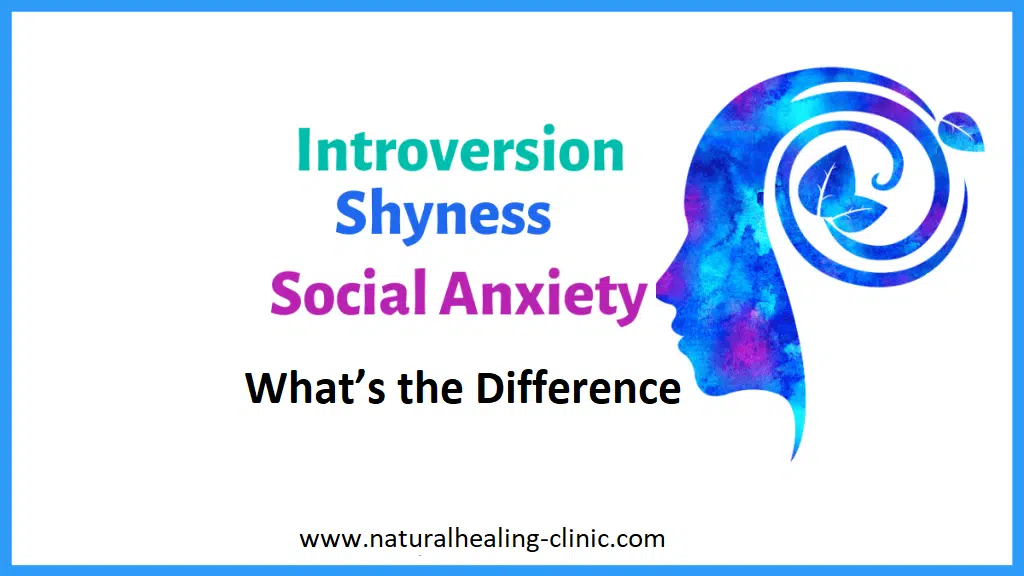Introversion, Shyness & Social Anxiety: What’s the Difference.

Introversion is a personality trait, and it appears in the Myers-Briggs personality typology.& The opposite is extroversion, and individuals may fall at different points along the continuum between the two. I lean strongly in the introvert direction. One of the key distinctions between introverts and extroverts is the kinds of situations that drain and replenish mental energy.
Shyness involves feelings of discomfort and awkwardness, typically when meeting new people. It can be an enduring personality trait, or it can appear during certain phases of development. It tends to appear in people with low self-esteem. Shy people may develop social anxiety disorder, but not necessarily. www.internationalhealingclinic.com
Social anxiety disorder, or social phobia, is a form of mental illness. It involves a persistent fear of being scrutinized by others or doing things to humiliate themselves in front of others. It comes with significant cognitive distortions and avoidance behaviors. Both introverts and extroverts can experience social anxiety disorder.
Alternative Therapies: www.lazzaropisu.com
Now that we’ve covered the basics, we’ll consider how different questions would be answered with respect to introversion, shyness, and social anxiety disorder.
What are common problems they may experience?
Introvert: While extroverts gain energy from being around other people, for introverts, spending time with others can be tiring, and they need alone time to recharge their mental batteries. Being in larger group social settings is particularly draining. There isn’t anything inherently distressing about being an introvert, although distress may result from social pressures to behave in a more extroverted manner.
Alternative Therapies: www.naturalhealing-clinic.com
Shy: People who are shy tend to struggle most with meeting new people.
Social anxiety: The level of anxiety often produces significant avoidance, and in severe cases, people may become house-bound because their anxiety is so crippling.
Do they want to be around people?
Introvert: While the introvert may want to spend time around people they’re close to, they still need alone time. Introverts don’t necessarily feel anxious about socializing, unless they have a separate issue with anxiety, but they may find it unpleasant, especially when there is a lot of small talk involved. www.internationalhealingclinic.com
Shy: People who are shy may want to be around others, but not feel confident that they have the social skills to interact effectively in situations that may involve being around people they don’t know well.
Social anxiety: People with social anxiety may actually want to spend time with others, but their anxiety disorder poses an extreme barrier that may feel insurmountable at times.
Are they worried about what other people think?
Introvert: While introverts often feel pressured to live up to societal expectations of extroversion, this is a result of how society views introversion and extroversion rather than an inherent characteristic of introverts.
Shy: There is some concern over what others will think that’s associated with shyness, but it’s not to the same level as in social anxiety. This tends to stem from an underlying lack of self-esteem. www.internationalhealingclinic.com
Social anxiety: In social anxiety disorder, this worry about the perception of others is high intense enough that it becomes pathological.
How do they feel after spending time with people?
Introvert: Introverts will often feel worn out after spending time with groups of people, unless it’s a small group of people they are particularly close to.
Shy: The discomfort associated with meeting new people may ease as the person gets to be more familiar. There may not be any unease when around familiar people.
Social anxiety: Overcoming avoidance is often the biggest obstacle. Once someone with social anxiety is actually in a social situation, it may turn out better than the catastrophes that were anticipated, and they may end up enjoying the social event in the end. Alternative Therapies: www.lazzaropisu.com
Does it change over time?
Introvert: Since introversion is a personality trait, it tends to be stable over time and across multiple contexts. My level of introversion has stayed fairly consistent, but when I was younger, I pushed myself to behave in a more extroverted manner. As I’ve gotten older, I’ve embraced my introversion more. www.internationalhealingclinic.com
Shy: In youngsters, the level of shyness may vary over time depending on where they are developmentally, but it can be an enduring trait that’s relatively consistent over time.
Social anxiety: Social anxiety disorder is a treatable illness. Cognitive behavioral therapy is the first line treatment, and SSRI-type antidepressants may also be used. Acceptance and commitment therapy is an alternative form of talk therapy that may be helpful .
What impact does it have on functioning?
Introvert: Introverts may dislike social situations where extroversion is demanded, but it doesn’t negatively impact overall functioning.
Shy: Shyness in children is associated with decreased classroom functioning.
Social anxiety: Social anxiety disorder, being an illness, has significant effects on social, occupational, and other domains of functioning.
Introversion, shyness, and social anxiety are three distinct phenomena, but they may also overlap in a given individual. Our natural cognitive biases can also feed into feelings of anxiety in social situations (you can read more about that in this post on cognitive biases and social anxiety).
Alternative Therapies: www.lazzaropisu.com